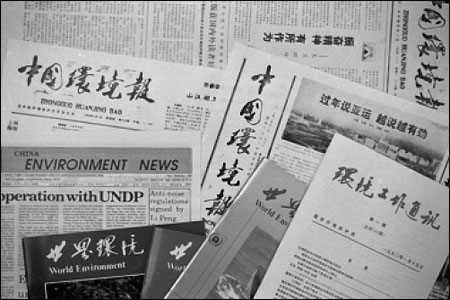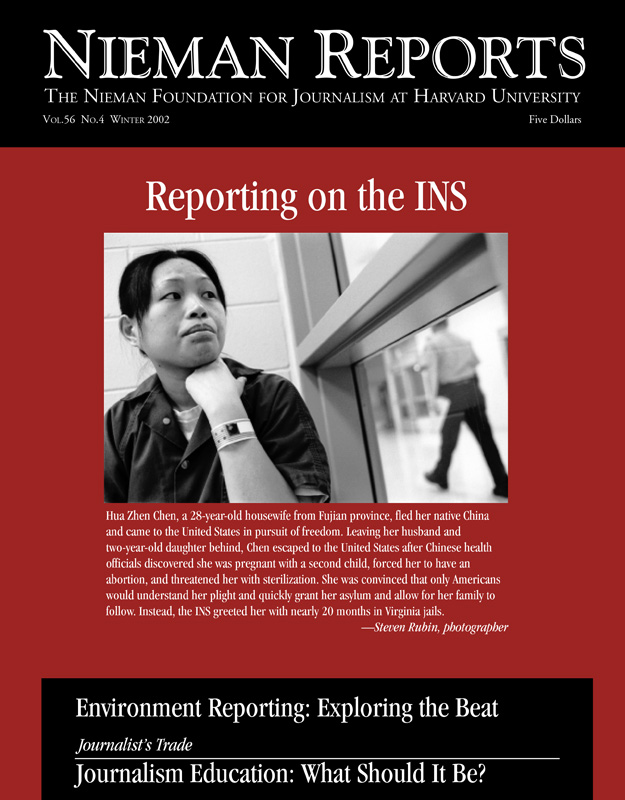
The Web site of China Environment News was launched on World Environment Day 2000. Top-level officials of the State Environment Protection Agency talked about environment issues with local citizens via the site on the same day. Photo by Deng Jia.
In 1984, China Environment News was launched in Beijing. It is said that it was the only national newspaper specializing in environmental reporting in the world. At that time, environmental reporting was in its infancy and, in China, no other media outlets were reporting environmental news. People rarely heard the term “environmental protection.” China Environment News brought to public attention national environmental policy, laws and regulations. It also exposed the polluting behavior of factories and disseminated environmental knowledge to the general public. Its mission was to promote environmental awareness and let people know of China’s dedication to environmental protection. Due to its reporting efforts, China Environment News was honored with the “silver medal” by the United Nations’ Environment Programme (UNEP) for its significant contributions in 1986. The next year, UNEP ranked China Environment News on the Global 500 Honor List. Now, in an effort to attract additional readers, China Environment News has added a weekend edition and more feature stories.
Reporting on People’s Lives
During the past decade, environmental media have seen a great transformation and have flourished in China. Now environmental issues are covered by both broadcast and print media. Major media agencies at national and local levels have special reporters to cover environmental news and have columns or programs dedicated to the environment. In 1993, an environmental coverage campaign, “Across China Environmental Protection Centenary Action,” was initiated. More than 6,000 reporters from news agencies at the national and local levels throughout China have taken part in this action.
Each year a theme reflecting the most pressing environmental problem has been selected for the campaign. Reporters send stories to their news agencies. This media campaign has been very effective in promoting environmental protection. Many resources have been provided for coverage of major environmental protection campaigns, such as resisting garbage from abroad and cleanup activities of the Huaihe River and Lake Taihu. Environmental reporting has also played an important role in supervising and changing the behavior of factories and enforcing the law. There are also some foreign environmental and nature TV programs being broadcast on China’s national and local television stations. For instance, “Earth Story” is broadcast on a China Central Television (CCTV) station every night.
Environmental reporting in China has also seen some changes in reporting style. In the 1980’s and the early years of the 1990’s, environmental reporting in China was covered in a narrow sense and limited to coverage of three kinds of pollution—waste water, waste gases, and solid waste. It failed to pay attention to the central element of the environment: people. To clean the heavily polluted Huaihe River and Lake Taihu, local environmental bureaus closed many small paper mills and dying factories. When reporting this event, news media only focused on the environmental cleanup and failed to report on what the factory workers would need to do to survive.
In recent years, to adapt to readers’ interests and needs, China’s environmental media has broadened its concept to include this “larger environment.” Reporters pay more attention to the lives of ordinary people and cover new topics, such as green food and ecotourism. For example, to conserve the ecological system of Daxinganling forestry reserve, in 1999 the Daxinganling Forest Corporation stopped felling trees. When CCTV reported this news, its coverage focused on the changing role of the corporation workers from lumbermen to treeplanters.

Chinese environmental publications. Photo by Deng Jia.
Journalists Interact With Government Officials
Unlike its Western counterparts, which are independent entities, China’s media agencies are still regarded as the government’s throat and tongue. In recent years, the government has started to deregulate the media sector, especially in less sensitive areas, such as sports, recreation and business. Chinese media have gradually become market-oriented; even private and foreign capital is entering this sector.
Even with these changes, the administrative structure of most media organizations remains the same. For instance, China Environment News is still affiliated with the State Environment Protection Agency (SEPA) and serves as SEPA’s propaganda organ. The topics covered as news are selected in a top-down manner. As SEPA’s propaganda organ, China Environment News has to cover routine activities of SEPA’s top-level officials and devote space to reporting on SEPA’s administrative conferences. In recent years, China Environment News has tried to reduce the number and length of these types of news stories.
This administrative structure also gives China’s environmental media advantages. News agencies receive government support and resources to help in reporting. The media campaign I mentioned earlier was initiated by the National People’s Congress. As the nation’s major environmental newspaper, China Environment News enjoys administrative support from SEPA in boasting its circulation and has relied primarily on SEPA to increase its circulation to more than 230,000, a high figure among the special interest newspapers. By contrast, the English edition of China Environment News, which was targeted at foreign readers, went out of business in 1998 since it lacked this governmental advantage in the foreign market. The English edition was cofunded by UNEP and SEPA in the late 1980’s, but UNEP stopped funding it. The paper had few paid subscribers and focused instead on selected foreign and domestic environmental organizations, sending them copies free of charge. After several years of losing money, China Environment News stopped publishing it.
As a developing country, however, environmental reporting in China suffers from financial strains. Because its main clients for advertising are environmental companies, and these companies don’t earn a lot of money, this revenue hasn’t been very high. This means that news agencies specializing in environmental reporting have few resources to do much investigative reporting or to send reporters to cover distant news events, especially when these events occur abroad. When the Kyoto climate conference was held in 1997, only Xinhua News Agency sent a reporter to the conference. Originally, China Environment News didn’t have an interview plan. I applied for funding from a European environmental nongovernmental organization to participate in the conference as its member. In this way, I was able to cover the Kyoto conference for China Environment News.
The Urgency of China’s Environmental Cause
China is the largest developing country in the world, yet its per capita forest and water resources are far below the world average level. China cannot afford to further degrade the quality of its resource base. It must find ways to balance economic development with environmental protection. In recent years, several large events have given the cause of China’s environmental protection new impetus. In the summer of 1998, a rarely seen flood hit the upper and middle reaches of the Yangtze River. The flood, aggravated by the problem of logging trees in the upper Yangtze River, caused serious economic damage and loss of human lives. Due to degradation of the ecological environment in nearby Hebei province, dust storms have occurred frequently in Beijing in recent years. Such problems have aroused the concern of the general public and the Chinese government.
To cope with environmental problems, the Chinese government has adopted measures to ban lumbering in natural forests on the upper reaches of the Yangtze River. And because China has been selected as the host country of the 2008 Olympic games, it must meet the Olympics’ environmental requirements. To do this, Beijing is taking actions to improve its air quality. As a responsible government, in the recent Earth Summit, Chinese Premier Zhu Rongji also announced that the Chinese government ratified the Kyoto protocol.
As the Chinese government pays more attention to the environmental cause and the general public shows more concern about environmental problems, China’s environmental media are presented with a very good opportunity, and it is likely that more resources will be allocated to environmental reporting. Since the start of 2002, China Environment News has increased its publication from four to six issues per week and changed its name to China Environment Daily. China needs the media to advocate for the importance of environmental conservation, and the environmental media should continue to play an important part in this endeavor, as they have in the past. There is a long way to go, and the environmental media still face challenges, but the future for this kind of reporting seems more promising than it ever has before.
Sun Yu, the 1999 environmental Nieman Fellow, is an editor of Fortune China magazine (the Chinese edition of Fortune). She was reporter and editor of the Chinese and English editions of China Environment News for 12 years and was awarded the 1998 United Nations Correspondents Association bronze prize for her coverage of the Kyoto climate conference.


